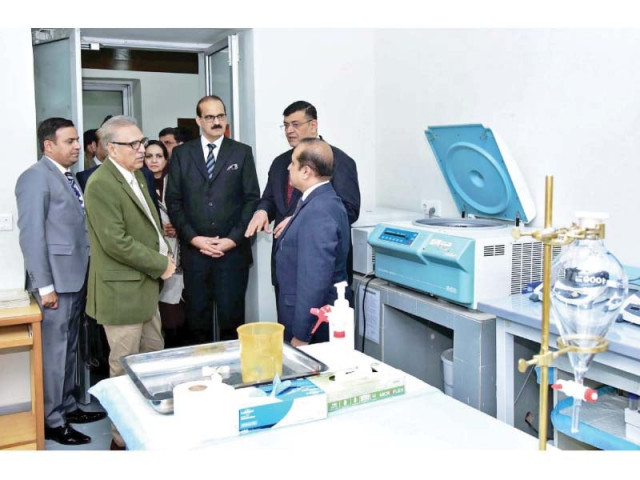After seven years: NIH restarts production of measles vaccine
President Alvi states research is key to improving health systems

President Dr Arif Alvi visited National Institue of Health and was briefed about the working of the facility. PHOTO: ONLINE
This was disclosed as President Dr Arif Alvi visited the National Institute of Health (NIH) on Wednesday. During the visit, he briefed on the institute by NIH Executive Director Professor Dr Aamer Ikram on the major initiatives being undertaken to transform the institute.
Federal Health Minister Aamer Mehmood Kiani said that that NIH was a national asset with enormous potential and has been contributing towards achieving Sustainable Development Goals (SDGs).
“Production of the measles vaccine for children, which had been stalled for seven years, has been resumed,” he said, adding that this was critical given the growing incidence of the disease across the country.
He said that a million doses of the vaccine have been prepared so far, while a further two million doses are expected to be prepared by June.
Prof Ikram said that the federal government has approved Rs751 million for the production of serums to meet the critical demands of vaccines and serums in the country.
“We are currently producing around 40,000 vials of snake anti-venom annually, which is a fifth of the country’s requirement,” he said, adding that the institute expects to meet around half of the country’s total anti-venom requirement by next June.
Moreover, Prof Ikram said they had started production of a number of vaccines including for measles, tetanus and diphtheria.
He further pointed out that another major issue was upgrading laboratory facilities at the institute in line with international standards.
“The BSL-3 laboratory, which conforms to global standards, was our first initiative at NIH,” he added
Prof Ikram noted that Pakistan cannot export vaccines without conforming to prevailing good manufacturing practices.
“We have prepared a policy in this regard which will be launched soon and will enable us to export vaccines,” the NIH chief said, adding that they are working on implementing a five-year-roadmap of international health regulations and the global health security agenda along with the implementation of integrated disease surveillance and response system in the country.
The NIH chief further said that for the first time, a master plan of the institute had been prepared, noting that the NIH has been designated as a national public health institute which broadens its mandate to prevent and control diseases.
Moreover, a public health act has been drafted along with a national laboratory policy, national biosafety policy, case definition book and bio-prism.
Dr Alvi said that health was the topmost priority area of the incumbent government. He added that they were committed to undertake reforms in this sector so as to provide efficient, equitable, accessible and affordable services to the people.
Noting that provision of good quality healthcare to all should be a joint vision for all stakeholders, Dr Alvi underscored that research was essential for the improvement in healthcare systems.
In this regard, he stated that investment in health research was critical to meet key challenges in the health sector such as prevention and control of communicable and non-communicable diseases, maternal and prenatal conditions, childhood diseases, and nutritional deficiencies.
He stressed that NIH should improve its facilities to match international standards and strive to enhance the quality of health services for the benefit of the people.
Health Secretary Captain (retired) Zahid Saeed, Health Director-General Dr Assad Hafeez were also present on the occasion.
Published in The Express Tribune, December 27th, 2018.



















COMMENTS
Comments are moderated and generally will be posted if they are on-topic and not abusive.
For more information, please see our Comments FAQ